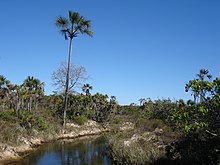The Devil to Pay in the Backlands
LC Class | PQ9697.R76 | |

The Devil to Pay in the Backlands (Portuguese: Grande Sertão: Veredas, "Great Backlands: Paths"; also translated as The Great Backlands and Their Paths) is a novel published in 1956 by the Brazilian writer João Guimarães Rosa.
The original title refers to the veredas, which are small paths through wetlands usually located at higher altitudes characterized by the presence of grasses and buritizais, groups of the
Plot
Grande Sertão: Veredas is the complex story of Riobaldo, a former

Riobaldo is born into a middle-class family and, unlike most of his contemporaries, receives an education. This enables him to begin his career as a tutor to a prominent local rancher, Zé Bebelo, and he watches as Zé Bebelo raises an army of his own jagunços to stamp out several of the local bandit gangs. Instead, for reasons that are never fully clear—apparently a desire for adventure—he disappears from the ranch and defects to the side of the bandits under the leadership of Joca Ramiro. Due to his excellent aim, Riobaldo becomes a valued member of the band and begins to rise in stature. In the course of the events Riobaldo gets acquainted with Diadorim, revealed later to be someone from his past who used the name, Reinaldo. Diadorim is a young, pleasant and ambivalent fellow jagunço. The two start a profound friendship, with Diadorim exerting an unusual attraction in Riobaldo. Throughout the book it is hinted that Diadorim is Joca Ramiro's nephew or illegitimate son.
Ramiro's men defeat and capture Zé Bebelo, but after a short trial, Bebelo is released. The war is temporarily over, but news later comes that two of Ramiro's lieutenants, Ricardão and Hermogenes, have betrayed and murdered him. As a result, the victorious army splits in two, Riobaldo staying with the current leader, Medeiro Vaz. When Vaz dies of illness, Zé Bebelo returns from exile and takes ownership of the band (this is actually where the book begins; the previous part is told in a very lengthy retrospective). They survive a lengthy siege by Hermogenes' men, but Zé Bebelo loses the taste for fighting, and the band is idled for nearly a month in a plague-ridden village. When this happens, Riobaldo mounts a challenge and takes command of the band, sending Zé Bebelo away.
Riobaldo, who has mused on the nature of the devil intermittently since the beginning of the book, tries to make a pact with the devil. He goes to a crossroads at midnight, but is uncertain as to whether the deal has been made or not, and he remains unsure for the rest of the story. He leads his band across a hostile desert and successfully ambushes and destroys Ricardão's men and kills Ricardão. He then moves against Hermogenes but is surprised; with difficulty and heavy casualties, his army defeats Hermogenes. The climax of the book is a knife fight between the two opposing armies. In the fight, Diadorim kills Hermogenes, but is in turn killed. Only after Diadorim's death is it revealed that Diadorim was in fact a woman. Riobaldo resigns command of the jagunços and settles down to a more conventional life. The final musings of the book are regarded as some of the most beautiful fragments of Portuguese language literature.
Television adaptation
In 1985, the novel was adapted for a TV-miniseries for the Brazilian network
English translations
The first English translation, by James L. Taylor and Harriet de Onís, was published in 1963. A second translation was undertaken by Felipe W. Martinez.
References
- ^ Martius & Spix. Viagem pelo Brasil. 1828, p. 109.
- Guardian Unlimited, May 8, 2002
